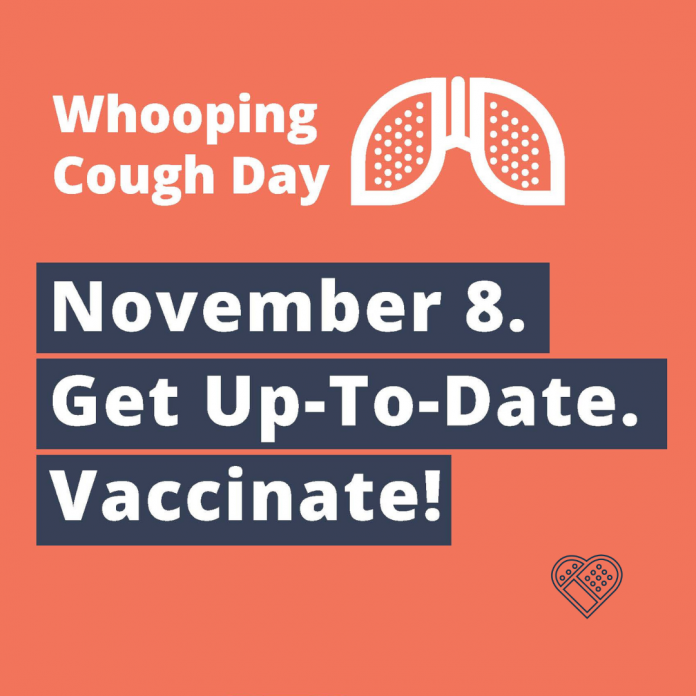Australia is in the grip of the largest whooping cough epidemic since the introduction of vaccines to protect against the bacteria, according to national notifiable disease data.¹
41,013 cases of the highly infectious and potentially deadly lung disease have already been
recorded in Australia this year – with another 53 days remaining in 2024.¹ This is more than the previous record set in 2011 when 38,748 cases of whooping cough (pertussis) were confirmed for the full year.¹
Approximately 130 confirmed cases of whooping cough have been recorded each day on average in 2024, with more than 45,000 cases of the respiratory infection expected by the end of the year.¹
The findings come as the Immunisation Foundation of Australia releases its 2024 Whooping Cough Report Card which reveals that New South Wales and Queensland have been hardest hit, with around half and nearly 30 per cent of notifications respectively.¹
The Report Card also found a major spike in cases among school-aged children, with nearly 40 per cent of notifications of the so-called ‘100-day cough’ recorded in 10-14-year-olds.¹
The Report Card’s launch coincides with Whooping Cough Day (8 November), which encourages Australians of all ages to remain up to date with vaccination.
Dr Laurence Luu, Chancellor’s Research Fellow and Lecturer at University of Technology Sydney said, “Epidemics of whooping cough follow a fairly predictable pattern, so we did predict a rise in cases this year.”
“However, we had not anticipated the magnitude of this outbreak, the largest since national
notifiable disease reporting began.”
Dr Luu said an epidemic of whooping cough was being compounded by a drop in community vaccination rates against the infection that can leave people of all ages seriously ill.²
“Given the significant rise in whooping cough cases, current vaccination rates are a major
concern,” he said.
“While we do an incredible job protecting newborns and infants, re-vaccination or ‘booster’ rates are alarmingly low.”
Research shows that in 2023, one-in-four adolescents turning 13 years of age missed out on their whooping cough booster, while only one-in-five Australians aged over 50 years is up to date for whooping cough vaccination.²,³ The Immunisation Foundation of Australia recommends adults get a booster shot at least every 10 years to maintain protection against the bacterial infection.
Dr Luu explained that whooping cough is more contagious than influenza, measles or COVID-19,⁴ “which means it can spread like wildfire”.
He warned that record-levels of infection are unlikely to abate, with the Spring and Summer months often associated with a spike in cases, and November usually being the worst month for whooping cough.⁵,⁶
The findings are of particular concern to Immunisation Foundation of Australia founder, Catherine Hughes AM. During the last epidemic, Ms Hughes’ four-week-old son Riley died from whooping cough complications.
She says that despite subsequent improvements in the prevention of whooping cough in infants and pregnant women, “whooping cough remains a public health threat in Australia”.
“Whooping cough can be deadly for infants and can lead to severe illness in older children and adults – especially those with asthma, who are four times more likely to be infected and have a higher chance of being admitted to hospital,”⁷,⁸ Ms Hughes said.
Whooping cough is a highly contagious bacterial infection that attacks the airways, causing
uncontrollable coughing and difficulty breathing. The coughing fits can be so severe that they cause vomiting, incontinence, broken ribs and hospitalisation.
As symptoms of whooping cough don’t appear immediately (often for a week or two following infection), the bacteria is easily spread and, once infected, a person can remain contagious for three weeks or until they complete a course of antibiotics.⁹ One infected person may unwittingly spread the disease to up to 17 unvaccinated people.⁴,¹⁰
“Australians should be alert to the signs of infection, ensure their vaccinations are up to date, and get a booster shot without delay if needed,” Dr Luu said. “If you have a new or ongoing cough, seek medical advice as soon as possible.”
Ms Hughes emphasises that although vaccination is the best defence against whooping cough, immunity decreases over time.¹¹
“Many people are unaware of the necessity for a booster vaccine and are probably not adequately protected against whooping cough,” she said.
“We all have a role to play in controlling the spread of whooping cough and reducing the risk of infection in ourselves and others. It takes community effort to protect against whooping cough.”
References
1. Australian Government Department of Health, National Notifiable Diseases Surveillance System
(NNDSS). Number of notifications of Pertussis by age group and sex
2. NCIRS. Annual Immunisation Coverage Report 2023. Available at:
https://ncirs.org.au/sites/default/files/2024-
10/NCIRS%20Annual%20Immunisation%20Coverage%20Report%202023.pdf
3. Hendry AJ et al. Tetanus, pertussis, and diphtheria vaccination coverage in older adults,
Australia, 2023: Analysis of Australian Immunisation Register Data. Medical Journal of Australia.
2024 Jul 17.
4. Shaw CL. and Kennedy DA. Theor Popul Biol. What the reproductive number ℛ0 can and cannot tell
us about COVID-19 dynamics. 2021 Feb; 137: 2–9.
5. Leong RNF, at al. Estimating seasonal variation in Australian pertussis notifications from 1991
to 2016: evidence of spring to summer peaks. Epidemiology and Infection. 2019;147
6. Australian Government Department of Health, Communicable Diseases Intelligence, Australian
vaccine preventable disease epidemiological review series: Pertussis, 2013–2018. 2022. Volume 46
7. Jenkins VA et al. Hum Vaccines Immunother 2020; DOI: 10.1080/21645515.2020.1738168.
8. Buck PO et al. Epidemiol Infect 2017;145(10):2109–21
9. New York State. Department of Health. Pertussis or Whooping Cough Fact Sheet. Available at:
https://www.health.ny.gov/publications/2171/
10.European Centre for Disease Prevention and Control. Expert Consultation on Pertussis. Available
at: https://www.ecdc.europa.eu/en/publications-data/expert-consultation-pertussis
11.Department of Health and Aged Care. Pertussis (whooping cough). The Australian Immunisation
Handbook. 2022. Available from: https://immunisationhandbook.health.gov.au/contents/vaccine-
preventable-diseases/pertussis-whooping-cough








